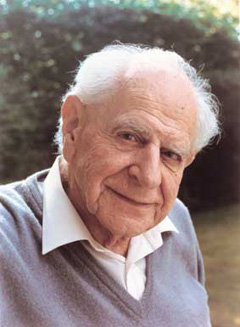Philosopher of science Karl Popper, main proponent of the theory of critical rationalism
To his ideas, Feyerabend asks two questions:
1. Is it desirable to live in accordance with the rules of a critical rationalism?
2. Is it possible to have both a science as we know it and these rules?To the first question, he describes briefly how solely objective and almost-mechanical processes of thinking such as that of critical rationalism slowly detach all freedom and other human interests: as he asks,
Is it not possible that an objective approach that frowns upon personal connections between the entities examined will harm people, turn them into miserable, unfriendly, self-righteous mechanisms without charm and humour?To understand this specific argument further, Feyerabend suggests Kierkegaard's work Papirer.
Feyerabend then expands further on the second question at hand, and focuses on the fact that such principles of critical rationalism "give an inadequate account of science because science is much more 'sloppy' and 'irrational' as its methodological image." Moreover, he refers to his previous chapters in which he discusses the fallacies behind the process of falsification-- or the method of rejecting theories based on "inconsistencies" (also see my previous posts about the example with the heliocentric model, of which this is one of).
Furthermore, he also argues how
Theories which [affect] the overthrow of a comprehensive and well-entrenched point of view, and take over after its demise, are initially restricted to a fairly narrow domain of facts, to a series of paradigmatic phenomena which lend them support, and they are only slowly extended to other areas.In the process of developing a new theory, we must step back and reconsider the problem. At this point, the emerging conceptual apparatus begins to "define its own problems, and earlier problems, facts, and observations are either forgotten or pushed aside as irrelevant." And this outcome, he argues, is especially harmful to scientific advancements by the numerous arguments that he notes in the first few chapters.
Lastly, he mentions at the end of the chapter that,
There is not a single rule that remains under all circumstances and not a single agency to which appeal can always be made.Does this statement suggest that the notion of critical rationalism is also flawed because every theory can be rejected? Do there exist 'laws" that always work? I leave these questions open for the reader to ponder upon.

Hey I am a student for education I am doing the module called Theorical framework in education I have a question that needs the names of the most proponent of critical rationalism and discuss two of his ideas please help me if you can admin.
ReplyDelete